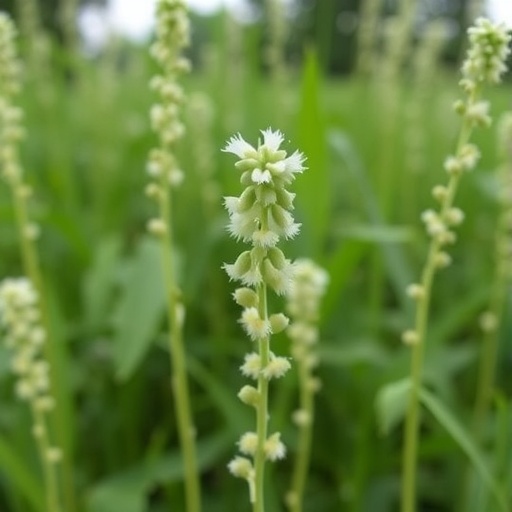In a groundbreaking study led by researchers K.N. Singh, A. Tiwari, and D. Srivastava, a significant advancement in the understanding of plant disease resistance has been reported. This research focuses on the isolation and molecular characterization of a cDNA clone that encodes a lipoamide dehydrogenase from the plant species Sesamum alatum, which has shown implications in disease resistance mechanisms. The emergence of resilient crop varieties is critical, particularly in the face of increasing agricultural challenges caused by phytoplasma infections. As scientists delve deeper into plant-pathogen interactions, this study sheds light on the potential for developing sustainable agricultural practices.
Phytoplasmas are specialized bacteria that cause a range of diseases in various plants, leading to stunted growth, leaf discoloration, and even plant death. Their effects are particularly detrimental to important agricultural crops, including sesame. The research team’s focus on Sesamum alatum highlights the urgent need to explore and exploit genetic traits that could enhance resistance against these pathogens. By identifying and characterizing specific genes associated with resistance, scientists can open new avenues for breeding programs aimed at developing more resilient crop varieties.
Through their meticulous work, the research group successfully isolated a cDNA clone encoding a lipoamide dehydrogenase, an enzymatic protein that plays a crucial role in various biochemical pathways within plants. The involvement of lipoamide dehydrogenase in several vital functions, such as respiration and energy production, makes it an attractive target for investigation. Understanding the role this enzyme plays in disease resistance could provide critical insights into the mechanisms that underpin phytoplasma interactions with host plants.
This study employed sophisticated molecular techniques, including reverse transcription PCR (RT-PCR), to extract and amplify the relevant cDNA sequences from Sesamum alatum. By utilizing these advanced methods, the research team was able to obtain a comprehensive profile of the lipoamide dehydrogenase gene. The molecular characterization involved in-depth sequencing and analysis, which revealed significant information about the structure and function of this gene in the context of disease resistance.
One of the most compelling aspects of this research is the potential application of the findings in the real world. As agricultural landscapes continue to face challenges posed by phytoplasma infections, the insights gained from this study could facilitate the development of genetic markers for plant breeding. By selecting for traits associated with the lipoamide dehydrogenase gene, breeders could potentially create new sesame cultivars that exhibit enhanced resistance to harmful pathogens, ensuring greater yields and improving food security.
Furthermore, the findings from this research underscore the necessity of a multi-faceted approach to combatting plant diseases. While molecular techniques provide valuable information about genetic resistance, integrating these insights with traditional breeding practices and sustainable agriculture is essential. This holistic approach ensures that farmers are equipped with robust tools to manage plant health and enhance productivity while minimizing environmental impact.
The implications of this research extend beyond just sesame cultivation. As lipoamide dehydrogenase is a component found in many plant species, understanding its role in one crop could lead to analogous discoveries in others. This could catalyze a wave of research into disease resistance across diverse agricultural systems, potentially paving the way for wider applications in crop protection.
Moreover, as global climate change continues to alter agricultural conditions, understanding plant pathological interactions is more critical than ever. Phytoplasmas may become more prevalent or evolve in response to changing environments, making preemptive measures, such as breeding resistant varieties, paramount. This study highlights the urgency of continued research alongside practical applications to mitigate the inevitable challenges that lie ahead.
Encouraging collaborations between molecular biologists and agronomists could further propel the practical implementation of these findings. By working synergistically, scientists can ensure that laboratory discoveries translate to field-level strategies that farmers can utilize to protect their crops. This kind of teamwork could cultivate innovations that underpin resilient agricultural systems worldwide.
In conclusion, the work carried out by Singh, Tiwari, and Srivastava offers a glimmer of hope in the fight against phytoplasma-induced crop diseases. Through the isolation of the lipoamide dehydrogenase cDNA clone from Sesamum alatum, this research provides foundational knowledge that could lead to the development of disease-resistant sesame varieties. The integration of advanced molecular techniques with practical agricultural applications can help secure the future of crop production, particularly as we face the dual challenges of climate change and growing food demand.
The continued exploration of genetic resistance mechanisms, as illustrated in this study, will undoubtedly play a vital role in shaping the future of sustainable agriculture. As science advances, the transformation of findings from the lab into on-the-ground agricultural practices means the world might soon see a significant reduction in crop losses due to diseases like those caused by phytoplasmas. This research stands as a testament to the power of innovation in overcoming agricultural challenges and ensuring food security for generations to come.
With extensive efforts in research and development, scientists remain dedicated to deciphering the complex interactions between plants and pathogens. By enhancing our understanding, we stand a better chance of fortifying our food systems against adverse influences and ensuring that agriculture can thrive even in the most trying conditions.
Thus, the foundational work presented in this study not only enriches our knowledge of plant biology but also emboldens the agricultural community to strive towards a more resilient and sustainable future.
Subject of Research: Phytoplasma-induced disease resistance in Sesamum alatum through lipoamide dehydrogenase cDNA clone.
Article Title: Isolation and molecular characterization of a phytoplasma-induced cDNA clone encoding a lipoamide dehydrogenase from Sesamum alatum implicated in disease resistance.
Article References:
Singh, K.N., Tiwari, A., Srivastava, D. et al. Isolation and molecular characterization of a phytoplasma-induced cDNA clone encoding a lipoamide dehydrogenase from Sesamum alatum implicated in disease resistance. Discov Agric 3, 107 (2025). https://doi.org/10.1007/s44279-025-00262-z
Image Credits: AI Generated
DOI: 10.1007/s44279-025-00262-z
Keywords: phytoplasma, disease resistance, cDNA clone, lipoamide dehydrogenase, Sesamum alatum, sustainable agriculture, crop protection, genetic markers, molecular characterization.




